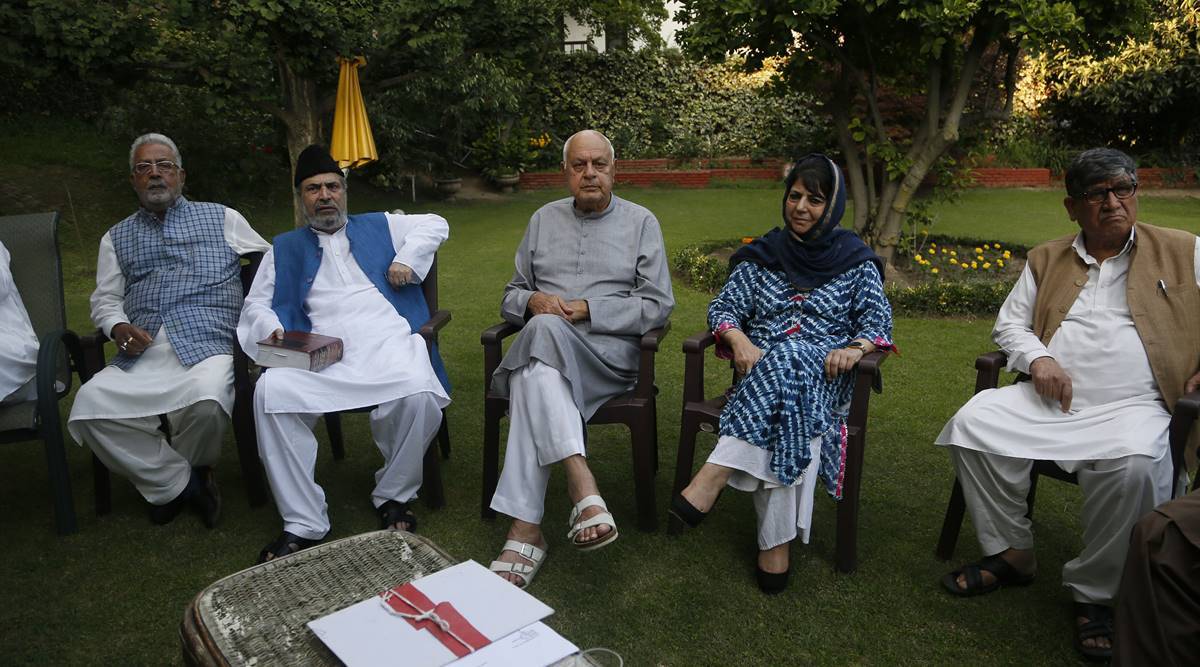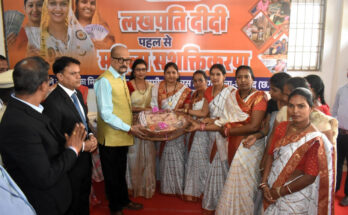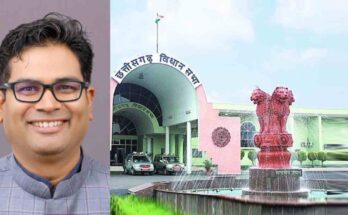New Delhi: August 23, 2020. The coming together of the Valley mainstream parties and their resolve to fight for the restoration of the special status of J&K is the first major political challenge to New Delhi, after a year of crackdown and large-scale detention of political workers to ensure compliance with the new order in J&K, now a Union Territory following its bifurcation.
This is the first time after August 5, 2019, when the six major mainstream parties — the National Conference, Peoples Democratic Party, Congress, People’s Conference, CPM and Awami National Conference — have come together. And the most important message of this new amalgam is its declaration that its “political activities will be subservient to the sacred goal of reverting to the status of J&K as it existed on 4th August 2019”.
“We unanimously reiterate that there can be nothing about us without us,’’ stated the joint declaration signed by National Conference president Farooq Abdullah, PDP chief Mehbooba Mufti, People’s Conference chief Sajad Lone, JK Congress president GA Mir, MY Tarigami of CPM and Muzaffar Shah of Awami National Conference.
This joint declaration to reiterate an agreement that these parties had reached on August 4, 2019, hours before the abrogation of J&K’s special status and their detention, is important because it is happening after a year of silence on the issue. It is also significant because the unprecedented crackdown, which accompanied the decision to abrogate the special status and dismembering of the state, hasn’t been able to force these mainstream political parties to toe New Delhi’s line and accept the massive change in J&K’s status within the Union.
This joint declaration will also have a bearing on any future political process in J&K because these parties, that constitute almost the entire mainstream, have made it “subservient” to the goal of reverting J&K to its special status.
It is clear that the efforts made by New Delhi in the last one year which saw mass detentions, raids, cases have not borne fruit. There are two reasons for that.
First, these parties have read the public mood which is completely against any reconciliation with the post August 5, 2019 status. A vast majority see the abrogation as a “humiliation” and the use of might to disempower the majority population in J&K.
While the PDP has already split, leaving a small group still with former Chief Minister Mehbooba Mufti, the National Conference has stayed intact as a party. Mufti, who is the only top mainstream leader to remain under detention, has made it amply clear that she and her party won’t accept the abrogation of the special status and will focus their politics in fighting it.
There has been churning within the NC too after senior leader and party spokesman Aga Roohullah spoke publicly in May, asking the party leadership to break its silence and express its “principled stand” against the abrogation of the special status. Several top leaders from NC’s old guard also warned the party leadership “against any compromise” saying it will be a “death knell” for the party and its future.
The leaders of these parties, which have their base primarily among the Muslim majority population of J&K, are worried about what they suspect are plans to engineer a demographic change — almost every government decision taken since August 5, 2019, in their view, points to that. They see the decisions to enact a domicile law, notify strategic areas where armed forces can carry out construction etc without any role of the civil administration, the new housing policy, earmarking land for non-local industries and businesses, award of contracts for mining in Kashmir’s rivers and streams to non-locals, as steps to disempower the local population.
And there’s a second reason for this show of unity and resolve to fight for the restoration of the special status. Sources say New Delhi has refused to provide any room to these political parties in the last one year, especially after their release. Those who were interested to negotiate a way forward were not given any commitment on restoration of even statehood.
Instead, New Delhi has been planning a complete break from the past, setting up a new mainstream camp which consists of the Apni Party – a group formed by former legislators and ministers who were part of the PDP, and individual politicians – and a group of panchs and sarpanchs. In fact, BJP has been the only party conducting any activity in J&K in the last one year.
This plan may have worked if one or two of these major mainstream parties had agreed to become part of the post August 5, 2019 J&K unconditionally. That hasn’t happened.
This joint declaration is also a red line that these six parties have drawn for themselves. The declaration that they will jointly fight for restoration of the special status and their political activity will be subservient to this goal has removed any possibility of a compromise to join the post August 5, 2019 mechanism.
The most curious case in the formation of this joint front is Sajad Lone and his People’s Conference. Lone had aligned with the BJP even before the 2014 Assembly elections and was seen as the main alliance partner of the BJP in Kashmir. After being in detention for almost a year, Lone too seems to have realised that there is no room for his and his party’s politics in BJP’s ‘Naya Kashmir’. In fact, the reason why Lone was detained, sources say, was his participation in a similar all-party meeting on August 4, 2019 where the first Gupkar declaration was issued.
There is growing realisation even among the mainstream parties that the main reason why the abrogation of special status and the subsequent decisions have happened is because New Delhi looks at J&K through the Hindu-Muslim binary. And as new proposals and government orders are rolled out, these parties and leaders, who have their base among the Muslim majority, see complete disempowerment — political, social and economic — of their core base in the near future. This is why there is no road ahead for them, other than opposing the abrogation of the special status.
On the ground, however, this joint declaration by the major mainstream parties isn’t enough for them to rustle up public support. In fact, it is too little because these parties and their leaders are being seen as responsible for the abrogation of the special status and the other moves that New Delhi took in the last one year.
The political moves and programmes of this new mainstream amalgam, which has almost all the major parties in it, will determine its fate. If it fails to come up with a political programme to build pressure on New Delhi, this unity and the declaration to fight will have no meaning.




